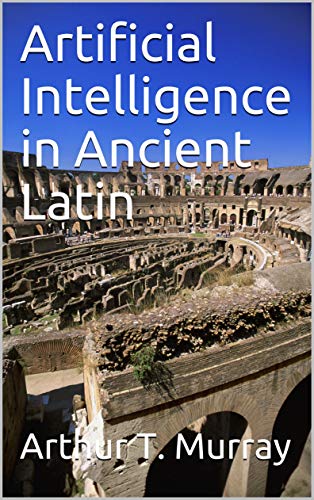Abstract
The Latin AI course, like the
Russian AI course, is a special version of the English-language
AI 101,
AI 102, and
AI 103 series in the year-long community college AI course leading to the Certificate for
AI Mind Maintainer.
Introduction
Although knowledge of both Latin and a computer programming language may
be considered as prerequisites for the Latin AI course, a student could
be learning Latin and programming concurrently with the taking of this course.
- Week 02: Computer Science
We introduce JavaScript or
Perl another programming language, such as Python.
Students should already know at least one programming language, or should be
in the process of learning a programming language. A computer science adept
may ideally be intent upon coding the
Latin AI in a programming language that does not yet have a
Latin AI Mind.
- Week 03: Linguistics
Students should either already know Latin syntax and inflectional word-endings,
or be in the process of learning them.
- Week 04:
Sensorium and
Motorium
Students shall study first the
Sensorium module as the initial pathway of
auditory input into the
memory of the Latin AI. Instructors will contrast the Sensorium module
for input with the robot Motorium module for output.
- Week 05:
OldConcept and
NewConcept
Students shall learn that the sensory inputs lead to concepts in the
Mens Latina, and that either old concepts are recognized or a new concept is formed
when a Latin word is not
recognized as being an already known, old concept.
- Week 07: AI Main Loop and PraeScium Mindboot Sequence
- Learning about the
MainLoop module will include the fact that the
PraeScium sequence is called only once to load the
AI Mind with some basic Latin vocabulary to get the AI up and running
with the ability to learn more Latin words from human users.
Students shall interact with the
AI Mind and create transcripts of their interaction showing various
features and functions of the AI Mind.
- Week 08:
ReJuvenate for Immortal AI
Academics will admit that the
ReJuvenate module is necessary only if the artificial intelligence
has such a limited memory that it becomes necessary to forget the oldest memories
in order to make room for new memories.
- Week 09: Free Will and
Volition
Before the study of
thinking in Latin, which along with emotion is a component of
free will or volition, students shall learn that the Volition module calls
the emotion module and the Latin-thinking module.
- Week 10:
LaThink Module for Thinking in Latin
Latin thinking is so different from English thinking (but not so different from
Russian thinking), that the Mens Latina AI Mind must include software routines
that focus more on inflectional endings in Latin than on the word-order (syntax)
that matters so much in English.
- Week 11: Indicative and Imperative Moods
Instead of forming Latin sentences itself, the
LaThink module calls a subordinate module such as
Indicative to assemble concepts and their Latin words into an example of
Cogito Ergo Sum, or "I think, therefore I am." Although Latin makes
heavy use of the subjunctive mood, our primitive Latin AI Mind does not yet
include a Subjunctive mind-module, which an enterprising student may yet create.
- Week 13: LaVerbPhrase
The module for Latin verb-phrases finds a Latin verb for inclusion in cogitation.
The module searches for a Latin verb conforming with parameters such as
person and number. If the correct Latin verb form is not found in
auditory memory, the LaVerbPhrase module calls the LaVerbGen module to generate
the required Latin verb form.
- Week 14: LaVerbGen creates missing verb-forms.
- Students will tweak software to show whether a verb is simply being found
in memory or is being generated by LaVerbGen.
- Week 15: LaAdjective and Adverb
These modules must
yet be coded to handle Latin adjectives and adverbs.
- Week 16: ConJoin Module for Compound Sentences
The
ConJoin mind-module supplies a Latin conjunction to connect things like two nouns or
two verbs or two phrases. Typically ConJoin is called when several concepts are
simultaneously activated and therefore warrant being joined together by a conjunction,
as in the Latin sentence, "Divide et impera," or "Divide and conquer."
- Week 18:
SpreadAct for Spreading Activation
- SpreadAct mind-module helps the
Mens Latina to
answer questions in Latin
- Week 19:
Inference for Automated Reasoning
The Latin AI has achieved automated reasoning with logical inference.
If we tell the AI, "Marcus est puer," ("Marcus is a boy"), the
AI asks us, "LEGITNE MARCUS LIBROS?" ("Does Marcus read books?").
- Week 20:
Metempsychosis -- AI Soul Travel
A more advanced Latin AI will be able to move from website to website
by copying itself at a new location while deleting itself at the old location.
- Week 21: Singularity
We are on the verge of a Technological Singularity so drastic that we
cannot see beyond it.
- Week 22: Review for Final Exam

